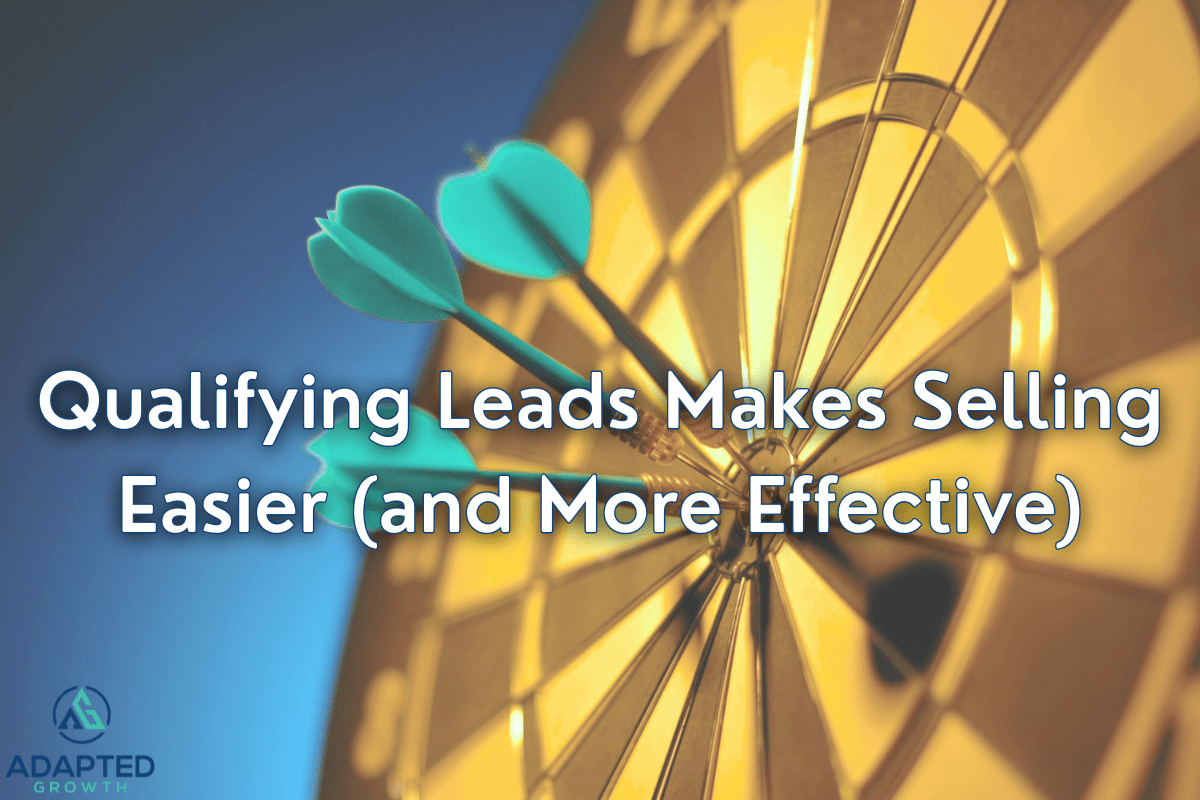
There are a ton of ideas, phrases, and beliefs in sales practices that make me cringe. They’re outdated, ineffective (at least now, if not before), and do way more harm than good. But the one that might be worse than all the others is “assuming the sale.”
I shudder every time I hear a sales coach or trainer say it.
What’s worse, it’s still taught and encouraged so often.
When used correctly, it can be an effective and valuable technique for quickly closing a deal. It works great for places like AT&T or Best Buy, places where people walk in knowing they’ll buy something.
But salespeople and entrepreneurs have a tendency to jump the gun, and that’s when it doesn’t work so well.
Why Assuming the Sale Doesn’t Always Work
Assuming the sale, also known as assumptive selling, is meant to be a closing sales technique. You’ve gathered their pains and needs, made your pitch, and now, the only thing between you and a closed deal is asking, “How will you be paying today?”
Sounds easy enough.
Unfortunately, techniques like these only work well when applied correctly and with the right mindset. And this one is frequently brought out too quickly, too strongly, and too inappropriately. More often than not, every unprompted phone pitch or door-knock rant ends with “Will that be cash or credit?” before the prospect has even had a chance to get a word in.
Devout ‘assuming the sale’ practitioners have a tendency to talk more than listen. They assume the prospect will say yes before they’ve uncovered anything concrete about what they actually need or want.
When you stop and think about it, why was this ever a thing anyway? I’m sure you know that other popular and absolutely true phrase about assumptions and why they’re bad.
Assumptions never help anybody on either side of the table.

Rethinking Old Sales Techniques
Like many people, I was taught early in my career that assumptive selling works. Even then, before I knew everything I know now about sales and communication, I hated it. It felt slimy. And it reminded me of all the times it had been used on me.
But that was 20+ years ago.
I’m sure it started with good reason. Back before the internet opened up a worldwide market for almost every industry, salespeople had to make every conversation count. Having an abundant sales mindset wouldn’t be possible when you had to work within a 20-mile radius.
Today, your leads are global, or at least more far-reaching than before. And your prospects are much better educated on the tactics salespeople use. They’ve heard it all, and many of them know exactly what to say to make you trip over yourself to share your pricing, your process, and your magic.
Unknowing salespeople fall into these traps all the time and then can’t understand why they have to work so hard on their follow-up. (Little tip: if you have to follow up more than once, it’s likely that they’ve already made their decision. They just don’t want to say no to you.)
With all of that, assuming the sale and manipulating them into something that they don’t want won’t help you in most cases. At best, they’ll find it annoying and back off. At worst, they’ll feel bulldozed, and you’ll have almost no chance of building the trust or rapport needed to move past it.
That goes for any sales technique that tries to push people into making a decision they’re not ready to make.
Sales Techniques Today
I’ve heard this line from so many people at this point it might as well be a business/sales commandment, especially since it’s true:
“If everyone else is doing it one way, stand out by doing it differently.“
We’re in the age of information, and everyone is dying to “provide value” to get your email address. Do you think your B2B prospects are not downloading sales script templates, closing technique cheat sheets, and all the same things you are?
Why wouldn’t they?
Instead of doing all the usual stuff that everyone hates, why not approach it from a different angle? Stop limiting your prospect’s ability to make their own decisions. Instead, prove you’re different by:
- letting them be honest about how they’re feeling by asking open-ended questions,
- asking for permission to move forward in the conversation and sales process,
- giving them permission and space to say no if they feel they should,
- and holding them accountable to any agreements they make.
Essentially, engage in an even-sided conversation, and then let them make their decision.
Consultative Selling > Assuming the Sale
Sitting down with your prospects, creating an open dialogue, and helping to guide them into the best decision for them is called consultative selling. It focuses on the actual person and the relationship. Although I don’t love the term, I do believe that this is the absolute best way to sell.
Consultants, the good ones anyway, don’t walk in and shove a solution in their client’s faces. They take the time to understand the problem from every angle, ask hard questions to dig as deep as possible, and push back on ideas that don’t serve their clients. They do all of this BEFORE they try to solve the problem.
You can’t do that when you’re assuming the sale.
I often reference the type of salesperson who waits about three minutes into a sales conversation before saying, “I understand exactly where you are; I see it all the time. I know just how to fix it, and I have the solution here. Which card are we using today?”
On some level, we’re all guilty of some version of this, though usually to a less obvious degree. It’s difficult not to make those assumptions when, due to our expertise, we know that we can help. So even if we don’t say all that, we might not be giving them our full attention. We’re champing at the bit for a chance to say, “Ha, see! I’ve got your answer right here!”
And that’s when we might miss something really important, something that leaves us chasing that close that’s never going to come.

Check Your Assumptions
It’s hard to turn off, but if we keep asking questions, we don’t give ourselves the chance to make dangerous assumptions.
Let’s say that we’re selling websites, and someone tells us that their site is old and it’s hurting their sales.
Instead of nodding along because we have heard this many times before, dig deeper. Ask:
- Why do you feel that way?
- How long have you felt that way?
- Did you see some sort of gradual drop-off in your revenue?
- Are your competitors updating their sites and that’s how you know?
We would (hopefully!) ask these same kinds of questions if they said they didn’t need a new website. So why not do the same thing when they say they do?
There’s a big difference in how easily you can close a deal when they’re only saying, “Yeah, my site could probably look better,” versus a decisive, “The dated look of my website is costing me business.”
One is a want; the other is a need. Which do you think has them pulling out their wallet quicker?
If we take the time to sit down, listen, and ask them enough questions to get them to that second statement, we’re building the trust we need to close. AND BONUS: they will sell themselves to you!
No begging, no chasing, and no assumptive selling.
Instead of Assuming the Sale, Do This Instead
So if you take away this tiresome technique from your closing process, what do you do?
Great question! If you did everything else well, including:
- qualifying them for your service/product,
- qualifying yourself as being able to provide the solution they need,
- and dealing with any potential objections upfront,
Then closing can be as simple as one final open-ended question. And you don’t really have to change much from your usual sales process.
My favorite is, “Where do we go from here?”
It puts the client right where they want to be, in charge of making their own decision. Not only that, but I look WAY more confident as a salesperson that is happy to hand over the reins, unlike other pushy salespeople.
There are only a couple of answers here, and when you get permission about how to leave the conversation, you are always covered.
Setting expectations is the name of the game, and that doesn’t change in your close. But there’s a big difference between setting the expectation of when you will get back in touch or send the scope/proposal versus asking, “Will that be cash or credit?”
Drop the Technique and Just Have a Conversation
I get it; sales gurus have been touting the benefits of assuming the sale for decades. That doesn’t mean it works, though, especially depending on your industry. Even when it does work, because yes, it will with the most conflict-averse, it still probably won’t benefit you in the long run.
Those unwanted yesses will either turn into long, drawn-out chases, unqualified clients that drive you crazy, or unhappy clients that are disappointed in what they got because they should’ve found a better fit.
Do you really want to deal with any of that?
You don’t have to when you go into every sales conversation with their best interest at heart. Take your time with prospects, empower them to make their own decisions, focus on building trust, and qualify them enough so that you both feel confident that a yes is the right choice.
And then you can ask how they’d like to pay.
Do you want to improve your conversations and close more qualified deals?






